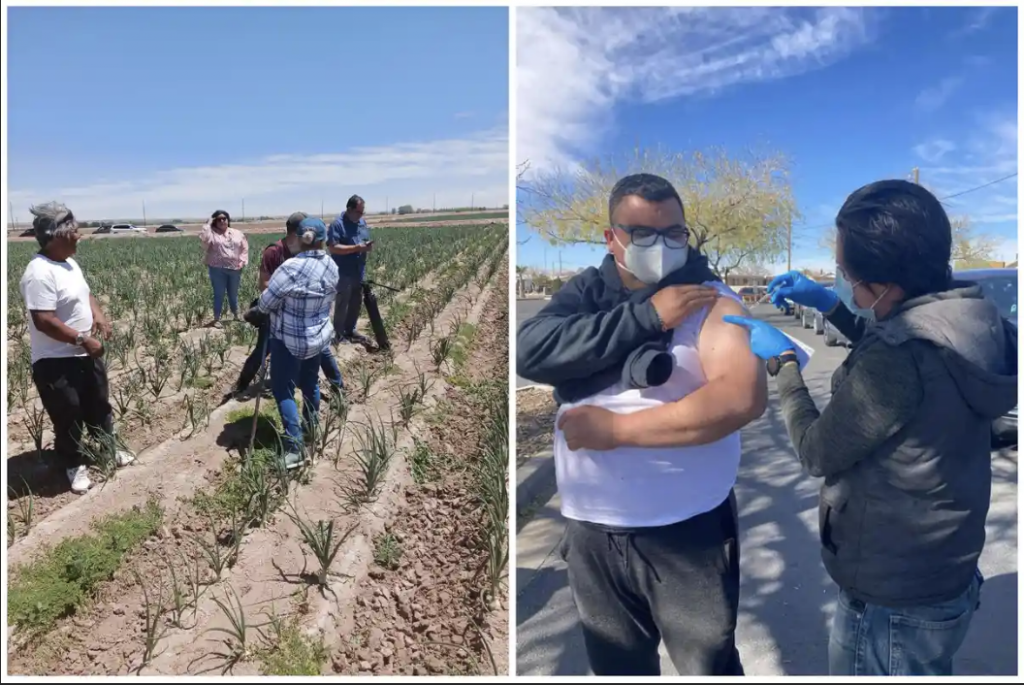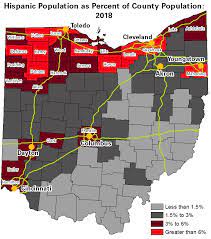
Promotoras were instrumental during the pandemic, helping residents get vaccines and lobby for potable water. Photograph: Courtesy of Amber X. Chen (Chen)
The Familias Triunfadoras, promotores de salud “promoters of health”, are a mobile unit clinic that provides medical support and aids the communities of the Borderlands reach out to surrounding professional organizations with the resources they require. This includes physical illnesses, mental health resources, as well as food and housing assistance. Familias Triunfadoras has created better lives for the El Paso community but still struggles with the limitations the colonias present regarding lack of basic needs such as access to running clean water or proper sanitation. During the pandemic, the promotores risked their lives and administered information about COVID-19 as well as vaccines, protective equipment, and personal hygienic products. Amber X Chen presents the Familias Triunfadoras as a lifesaving, non-profit group that are under appreciated and underfunded women making a difference in the Borderlands of Texas and Mexico.
The article focuses on the Familias Triunfadoras and the struggles the workers have within it, with firsthand accounts from those who live and work in the area. Familias Triunfadoras was founded by Marai Covernali in 2009 who worked to give gender violence survivors a chance to reclaim their lives in helping others in their community and become “self-sufficient” (Chen). Covernali has helped certify over 700 promotoras in El Paso County but still is struggling to help the community gain access to basic needs such as clean, running water or sanitation, and safety features such as traffic lights or sidewalks. Chen interviewed multiple sources from the community such as Claudia Salazar, who works as a promotora in Familias Triunfadoras, the founder of Familias Triunfadoras, Maria Covernali, and three women who work at surrounding universities in California, Guillermina Gina Núñez-Mchiri, Nora Hernandez, and Eva Moya. They all are of Hispanic background work alongside the promotoros to benefit the El Paso Community. Chen is a student at The University of California, Berkeley and is a minority herself in a state that deals with immigration due to the Cali-Mex border.
Chen uses two studies to show that “1/3 people in Texas’s Rio Grande Valley are uninsured or underinsured” (Chen) resulting in a case study done in 2021 showing that community averages of the rate of obesity, diabetes and depression levels were higher than the national average. She does not share the names of the studies nor who conducted them. The 2021 study gives aggregate data, a rough summarization without any actual quantitative data. There is not enough context for the readers to interpret any other way, the assumption is already given. Useful quantitative additions would be to add a chart showing the population of each colonia and how many were insured in past years compared to 2023, after the promotoros helped them gain medical assistance. Even a poll and a population percentage chart would be beneficial for researchers to analyze the ordinal, categorical data, as to how strongly the population feels about their safe access to medical assistance. I.e., 8% say they strongly disagree that they are confident in their abilities to reach out for mental health assistance, in which the promotoros could see and provide the national suicide hotline, 988, or be able to reach out and de-escalate situations.
Chen includes multiple qualitative sources she interviewed, each have similar relationships with the Familias Triunfadoras promotoros but come from different backgrounds and share different branches off the topics to help the reader better understand the social lives of the community members. Chen introduces Claudia Salazar, who speaks on working as a promotora as well as being a working member of the community. Maria Covernali, the founder of the Familias Triunfadoras, shares that she created it as a way for domestic violence survivors to be certified as promotoras. Next, Guillermina Gina Núñez-Mchiri, the dean of San Diego State University’s Imperial Valley campus is used to explain the reasonings behind creating colonias and their downfalls in today’s age when they are used for long term housing. Nora Hernandez, who works at the University of Texas at El Paso works on the project of “mitigating the impact of Covid-19 among disproportionately impacted communities” (Chen) such as farmers and migrants in colonias of the El Paso communities. Each individual adds more evidence to the story of the Familias Triunfadoras, identifying a different problem the promotoros face and how they’ve accomplished so much with so little funding.
The author uses a good range of evidence to support her research. She did not use any sources from an opposing side, which is good because there is no bias in this article and should be none, because it is about a community trying to live and survive. Chen used good qualitative evidence to paint the picture for the reader of a non-profit organization, created for the underprivileged community in El Paso County in Texas. She used quantitative data but not in a good way; the reader was not able to identify where the data came from, see the data in a table or graph form, or create their own conclusions. This article relates to the class themes of immigration in the southern states in ways such as the inhumane treatment the immigrants go through as they live on US territory, they need to create their own resources inside their communities to be able to get medical assistance, and even when they do, they are underpaid and underrepresented in today’s media.
Chen, Amber X. “’We Have to Survive’: The Women Filling the Gap in Texas Borderlands’ Medical Deserts.” The Guardian, Guardian News and Media, 2 Feb. 2023, https://www.theguardian.com/us-news/2023/feb/02/medical-deserts-texas-women-healthcare.
